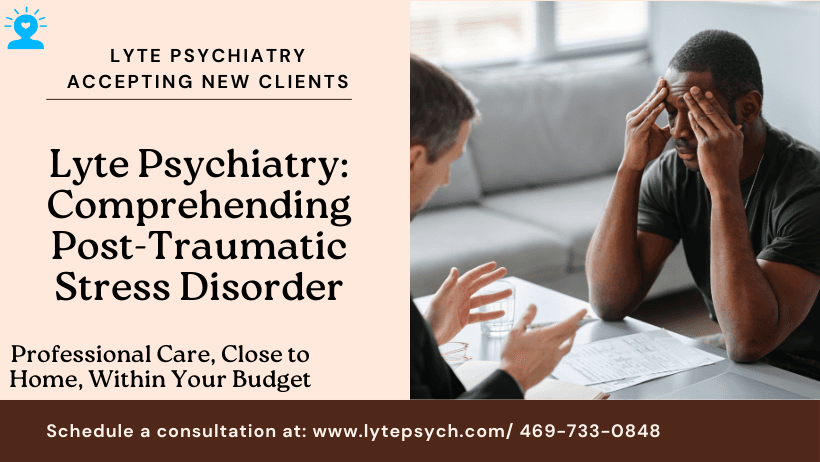Wed Jun 12 2024
Lyte Psychiatry: Comprehending Post-Traumatic Stress Disorder: From Signs to Treatment Options (Affordable Therapist and Psychiatrist Near You), Best Adults & Adolescents Psychiatrist and Therapist Near You, Dallas, Fort Worth, TX

Lyte Psychiatry: Comprehending Post-Traumatic Stress Disorder: From Signs to Treatment Options ( Best Adults & Adolescents Psychiatrist and Therapist Near You) Dallas, Fort Worth, TX
Post-Traumatic Stress Disorder (PTSD) is a mental health condition that arises after experiencing or witnessing a traumatic event. This disorder can significantly impact a person's life, but with the right knowledge and treatment, recovery is possible. This article explores the signs of PTSD, its impact on daily life, and the various treatment options available.
Understanding PTSD: Signs and Symptoms
PTSD can manifest differently in each individual, but common symptoms include:
Intrusive Memories: Reliving the traumatic event through flashbacks, nightmares, or distressing thoughts.
Avoidance: Steering clear of places, people, or activities that remind the individual of the trauma.
Negative Changes in Thinking and Mood: Experiencing feelings of hopelessness, emotional numbness, or difficulty maintaining close relationships.
Changes in Physical and Emotional Reactions: Increased irritability, being easily startled, or having difficulty sleeping.
These symptoms can begin within a month of the traumatic event, but sometimes they may not appear until years later. The intensity and duration of symptoms vary, with some people experiencing them for a short period, while others may endure them for years.
Impact of PTSD on Daily Life
PTSD affects more than just mental health; it can also influence physical health, work performance, and relationships. Individuals with PTSD may struggle with:
Mental Health: Increased risk of depression, anxiety, and substance abuse.
Physical Health: Chronic pain, cardiovascular issues, and weakened immune response.
Work and Education: Difficulty concentrating, decreased productivity, and absenteeism.
Relationships: Strain on personal relationships due to emotional withdrawal or heightened irritability.
Treatment Options for PTSD
Fortunately, PTSD is treatable, and many individuals find relief through a combination of therapies and support. Some effective treatment options include:
Psychotherapy:
Cognitive Behavioral Therapy (CBT): Helps individuals identify and change negative thought patterns.
Exposure Therapy: Involves facing the trauma in a controlled environment to reduce fear and avoidance behaviors.
Eye Movement Desensitization and Reprocessing (EMDR): Uses guided eye movements to help process and integrate traumatic memories.
Medication:
Antidepressants: Can help manage symptoms of depression and anxiety.
Prazosin: Often prescribed to reduce nightmares and improve sleep.
Lifestyle Changes:
Regular exercise, healthy eating, and adequate sleep can support overall mental health.
Mindfulness and relaxation techniques, such as meditation and yoga, can help manage stress.
Seeking Help with Lyte Psychiatry (Best Adults & Adolescents Therapist and Psychiatrist Near You)
If you or a loved one is struggling with PTSD, it's important to seek professional help. At Lyte Psychiatry, we specialize in comprehensive mental health care, providing tailored treatment plans to support your journey to recovery. Our team of experienced professionals is dedicated to helping you regain control of your life and improve your well-being.
To Schedule an appointment. Click Here
To see our services. Click Here
Call us if you have questions at 469-733-0848
Frequently Asked Questions (FAQs)
Q: What causes PTSD?
A: PTSD is caused by experiencing or witnessing a traumatic event, such as a natural disaster, accident, combat, or assault.
Q: How long does PTSD last?
A: The duration of PTSD varies; some people recover within months, while others may experience symptoms for years.
Q: Is PTSD common?
A: Yes, PTSD can affect anyone, but it is more common in individuals who have experienced severe trauma.
Q: How can family and friends support someone with PTSD?
A: Offer emotional support, encourage professional help, and educate yourself about the condition to better understand their experience.